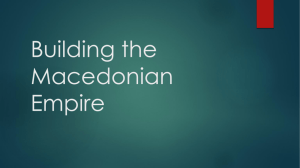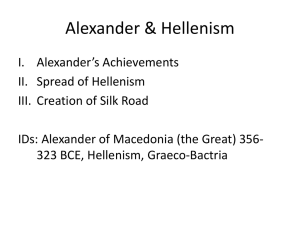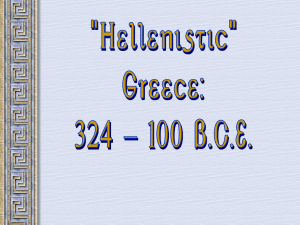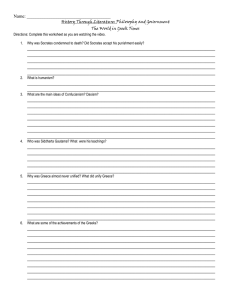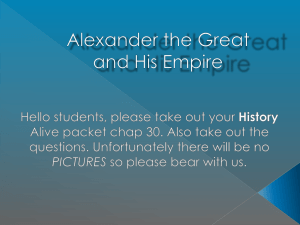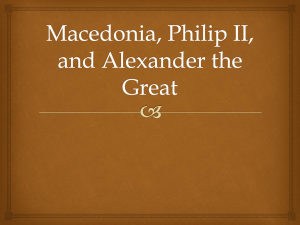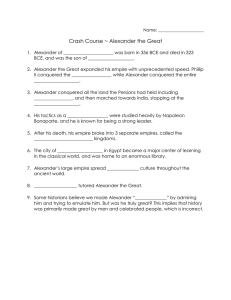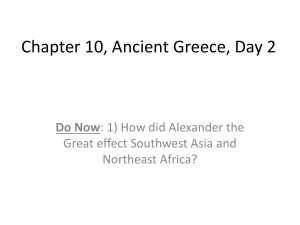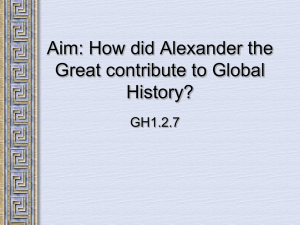Alexander the Great: Empire, Conquests, Hellenistic Culture
advertisement
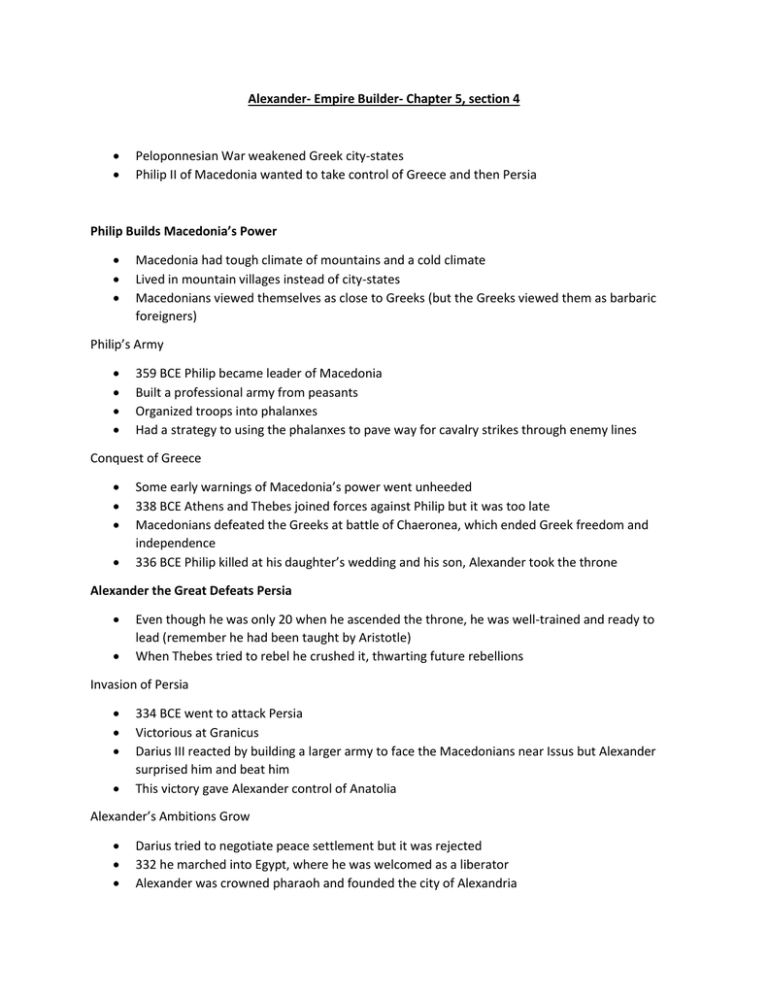
Alexander- Empire Builder- Chapter 5, section 4 Peloponnesian War weakened Greek city-states Philip II of Macedonia wanted to take control of Greece and then Persia Philip Builds Macedonia’s Power Macedonia had tough climate of mountains and a cold climate Lived in mountain villages instead of city-states Macedonians viewed themselves as close to Greeks (but the Greeks viewed them as barbaric foreigners) Philip’s Army 359 BCE Philip became leader of Macedonia Built a professional army from peasants Organized troops into phalanxes Had a strategy to using the phalanxes to pave way for cavalry strikes through enemy lines Conquest of Greece Some early warnings of Macedonia’s power went unheeded 338 BCE Athens and Thebes joined forces against Philip but it was too late Macedonians defeated the Greeks at battle of Chaeronea, which ended Greek freedom and independence 336 BCE Philip killed at his daughter’s wedding and his son, Alexander took the throne Alexander the Great Defeats Persia Even though he was only 20 when he ascended the throne, he was well-trained and ready to lead (remember he had been taught by Aristotle) When Thebes tried to rebel he crushed it, thwarting future rebellions Invasion of Persia 334 BCE went to attack Persia Victorious at Granicus Darius III reacted by building a larger army to face the Macedonians near Issus but Alexander surprised him and beat him This victory gave Alexander control of Anatolia Alexander’s Ambitions Grow Darius tried to negotiate peace settlement but it was rejected 332 he marched into Egypt, where he was welcomed as a liberator Alexander was crowned pharaoh and founded the city of Alexandria Conquering the Persian Empire Alexander then moved again at Persia They met at Gaugamela (near Nineveh) Alexander won again- and again Darius III fled (he was later found dead in a province south of the Caspian Sea) This allowed the Macedonians to march unopposed through Persia and captured Babylon, Susa, and Persepolis (giving the Macedonians great wealth) A fire destroyed Persepolis Alexander’s Other Conquests Alexander in India 327 BCE crossed into the Indus River Valley Powerful Indian army blocked his path. He eventually won but morale was low because it was such a difficult fight Alexander agreed to go back home He couldn’t govern in the end because he died of illness one year after returning Alexander’s Legacy After his death, the empire was split among his three strongest generals o Antigonus became king o Macedonia and took control of the Greek city-states o Ptolemy seized Egypt, took the title of Pharaoh, and established a new dynasty o Seleucus took the old Persian Empire, which became known as the Seleucid empire His empire managed to blend Greek, Egyptian, and Eastern customs The Spread of Hellenistic Culture- Chapter 5, Section 5 Alexander had set up many cities as outposts of Greek culture When he died, both the trade and the language continued to link these cities together Each region had its own traditions but they transplanted Greek culture Hellenistic Culture in Alexandria Blending of Greek (Hellenic) culture with Egyptian, Persian, and Indian influences was known as Hellenistic culture Koine- popular spoken language in Hellenistic cities Trade and Cultural Diversity Alexandria had a strategic trade location Became a very diverse city with people from all over settling there and by the 3 rd C BCE half a million people lived there Alexandria’s Greatest Attractions Alexander the Great’s tomb Statues to Greek gods Stone lighthouse called Pharos Museum- which was an institute of advanced studies Library- first true research library Science and Technology Alexandria became a center for science and technology using many of the advances made in Ancient Greece Astronomy Small observatory in the museum Aristarchus o Sun was bigger than the earth (although he got the size wrong) o Proposed that the earth and other planets revolved around the sun (this was rejected by most astronomers) Ptolemy o Placed the earth in the center of the solar system (geocentric theory) o This theory was accepted until the scientific revolution 1400 years later Eratosthenes o Calculated the earth’s true size o Director of the library Mathematics and Physics Euclid o Opened a school of geometry o Elements- book of proofs and propositions o Still used as the basis of geometry today Archimedes o Value of pi o Invented the compound pulley to lift heavy objects, a catapult, a screw o His work was used by other scientists to build a force pump and pneumatic machines Philosophy and Art Teachings of Plato and Aristotle continued to be very influential New schools of thought were concerned with how people should live their lives Stoicism Zeno (335-263 BCe) founded the school of stoicism Believe in a divine power that controls the universe People should live a virtuous life Human desires could be controlled Provided an ethical approach to life Epicureanism Epicurious founded Epicureanism Universe ruled by gods who had no interest in humans Greatest good came from virtuous conduct and absence of pain Main goal was to achieve harmony of body and mind Realism in Sculpture Largest Hellenistic statue is on the island of Rhodes- Colossus of Rhodes is bronze and over a 100 feet high Toppled by an earthquake in 225 BCE Sculptors created more natural works By 150 BCE Hellenistic world was in decline but a new city-Rome- would preserve much of the old Greek work
